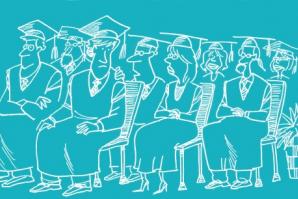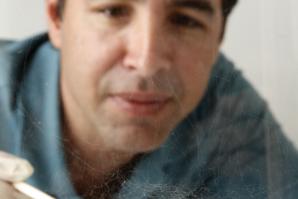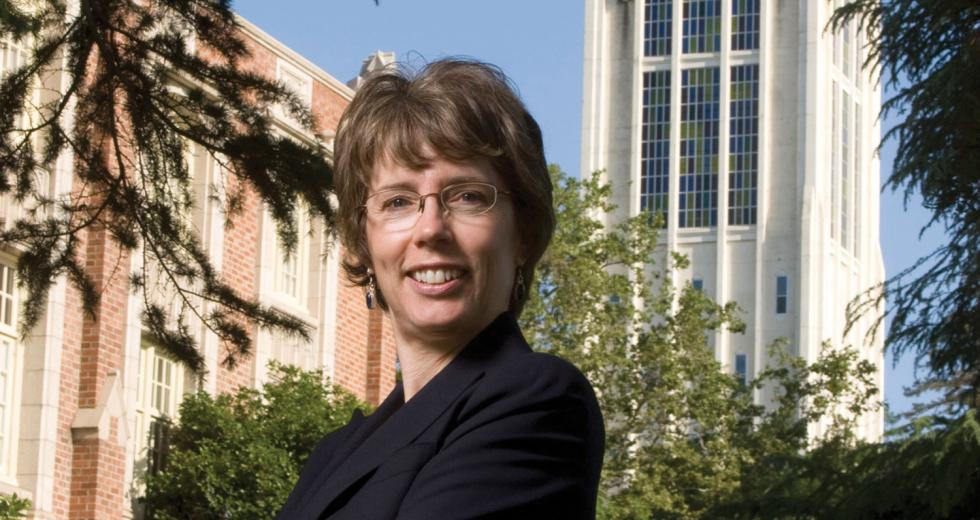Pamela Eibeck has made a career of distinguishing herself in the male-dominated fields of engineering and college administration while balancing life as a wife (of law professor William D. Jeffery) and mother of four children. This month, she reached another milestone and is reporting to a new job. Eibeck is the first female president in the 158-year history of University of the Pacific.
“A president is very much a business leader who is also an academic,” Eibeck says. “It makes a world of difference in undertaking the mission of the university.” Much of that mission depends on a president’s ability to build strong relationships with “friends and advocates of the university as well as those in the community who appreciate the role a university plays.”
Eibeck, 52, comes to the Stockton campus from Texas Tech University where she served as dean of the Edward E. Whitacre Jr. College of Engineering and oversaw 4,400 students and a $55 million budget. She was drawn to Pacific, she says, by the quiet charm of the campus, the enthusiasm of the students and educational policies that align with her philosophy of putting the student first.
“Right away I noticed a sense of realness and authenticity about her,” says UOP senior Nicholas Grainger. “I was impressed by the way she took time to meet with students, hear their concerns and build relationships. That’s exactly what you hope to find in a new president.”
Tom Zuckerman, the board of regents chair, says Eibeck earned the job with her track record of scholarship, administrative leadership and community involvement. Many of these qualities connected Eibeck to the legacy of retiring president Donald DeRosa, a man widely credited with improving the enrollments, endowments, fiscal stability and academic reputation of the university. Narrowing the gap between town and gown is another DeRosa legacy that Eibeck appreciates and intends to continue.
“The university is not an isolated entity,” she says. “I feel strongly that it has a role to play in promoting the good of the community and regional stewardship. A university must be totally connected to its community; it needs that community to be successful.”
Eibeck will take charge of a three-campus university centered at the Stockton main campus (4,600 students) and encompassing two professional schools: McGeorge School of Law in Sacramento (1,100 students) and Dugoni School of Dentistry in San Francisco (500 students). The Stockton campus includes the Eberhardt School of Business, the Business Forecasting Center, the Thomas Long School of Pharmacy and Health Sciences, the Conservatory of Music and Brubeck Institute. The university, which has a record number of applicants for its fall semester, opened the $37 million DeRosa University Center and a new science center in 2008. A $10 million technology center is on the horizon.
A president is very much a business leader who is also an academic.”
Pamela Eibeck, president, University of the Pacific
The Pacific presidency has brought Eibeck to Northern California, where her career began with an engineering doctorate at Stanford and a professorial appointment at UC Berkeley. Her scholarly background intrigued Stockton Mayor and education advocate Ann Johnston, with whom Eibeck huddled prior to assuming office to discuss broadening the partnership between the campus and community.
“The university is one of the positives of our city,” Johnston says, noting the outreach of student interns, mentors and faculty volunteers in Stockton. “It has wonderful resources, and we can call those resources to the attention of businesses and industries who are coming or are already here, seeking to train their work forces and making higher degrees available to employees.”
Building those bridges, she adds, can help Stockton acquire the reputation of a university town, much like Davis or Santa Cruz.
“It’s a two-way street,” Johnston says. “We have a university in the heart of the city, and we need to promote it and celebrate it because the future of our community relies on an educated work force. It’s a key component in our economic development.”
Eibeck says she’s delighted to be returning to California and living in a region where the agricultural roots and neighborly lifestyle match those she and her husband enjoyed in the Lubbock community of Texas Tech. Those who know her say it won’t take her long to make friends on and off campus.
“She’s a very intelligent, capable woman and a very warm, engaging person who brings a lot of enthusiasm to everything she does,” Zuckerman says. “We expect her to be a real asset to the university and community in dealing with problems accentuated by the current economic situation.”
Zuckerman and other Stocktonians view the new president as a force for progress. One hears that in the questions Eibeck herself asks about Pacific’s role in the recession and beyond. “Can we heighten and expand programs that really make a difference in the community? What are the greatest needs of the community? I have a sense that Stockton is grappling with issues that challenge many communities in California and across the nation.”
Some see a solution in the Eibeck style of outreach and access. Says Mayor Johnston: “The possibilities of working together, exchanging ideas and information and celebrating what the university and the community have to offer are growing closer. The best is yet to come.”
Recommended For You

Attention College Shoppers
Graduates' employment data may not tell the whole truth
Workers increasingly need a college degree to survive in today’s complex economy, so as college costs and student loan loads rise, parents and prospective students are asking tougher questions about the results to expect from a baccalaureate. But the answers they’re getting are often inadequate

Web of Possibilities
A UOP scientist on the verge of a breakthrough
The black widows caged in professor Craig Vierra’s laboratory evoke the macabre. But here, in the Department of Biological Sciences at Stockton’s University of the Pacific, these crawlers are the story’s heroines.



